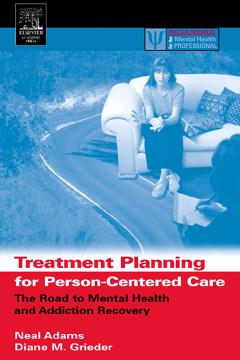
Additional Information
Book Details
Abstract
Requirements for treatment planning in the mental health and addictions fields are long standing and embedded in the treatment system. However, most clinicians find it a challenge to develop an effective, person-centered treatment plan. Such a plan is required for reimbursement, regulatory, accreditation and managed care purposes. Without a thoughtful assessment and well-written plan, programs and private clinicians are subject to financial penalties, poor licensing/accreditation reviews, less than stellar audits, etc. In addition, research is beginning to demonstrate that a well-developed person-centered care plan can lead to better outcomes for persons served.
* Enhance the reader's understanding of the value and role of treatment planning in responding to the needs of adults, children and families with mental health and substance abuse treatment needs
* Build the skills necessary to provide quality, person-centered, culturally competent and recovery / resiliency-orientated care in a changing service delivery system
* Provide readers with sample documents, examples of how to write a plan, etc.
* Provide a text and educational tool for course work and training as well as a reference for established practioners
* Assist mental health and addictive disorders providers / programs in meeting external requirements, improve the quality of services and outcomes, and maintain optimum reimbursement
"I strongly recommend this book to mental health administrators, supervising clinicians, and others... an outstanding resource for training candidates..." -PSYCHIATRIC SERVICES "Providers should consider this book as one of the most important instructional tools in... mental health and addictive disorders." -Wilma Townsend (From the Prologue) "Treatment Planning for Person-Centered Care puts the entire concept of individualized service planning into understandable language for all readers..." -Nikki Migas, M.P.A., Managing Director, Behavioral Health Customer Service Unit, CARF … the Rehabilitation Accreditation Commission. "Treatment Planning for Person-Centered Care by Neal Adams and Diane Grieder is a one-of-a-kind book." -Eric Goplerud, Ph.D., George Washington University Medical Center "This book will help practitioners develop the necessary... service plans that will significantly enhance our clients’ chances for real world success." -Ed Diksa, California Institute for Mental Health "The appendixes are very useful... In fact, I would consider using these appendixes as a template for recovery planning." -DOODY REVIEWS "...[the authors] are to be congratulated on such an excellent practical guide which is thoughtful, informative and so easy to read... " -Glyn Thomas, Organizational Development Director, Satilla Community Services "...our Director of Clinical and Rehabilitative Services and her senior managers have created a staff training based... on [the] book." -Wendy Gradison, LCSW, CPRP; President and CEO, PRS, Inc.
"Adams and Grieder’s Treatment Planning for Person Centered Care has its foundations in evidence and good clinical judgment. It is recovery oriented, reflecting person-centered values coupled with practical guidance. Clinicians and administrators would do well to build on the foundations of this excellent book. We use it in our work on training and implementing Evidence-Based Practices in the Public Mental Health System in Maryland. We have found that this strengths-based approach ensures the consumer voice is central to treatment planning. It also balances program and provider needs to meet medical necessity criteria and other requirements for payment of service."
-Howard H Goldman MD PhD, Professor of Psychiatry and Director of the Mental Health Systems Improvement Collaborative, University of Maryland School of Medicine, Baltimore -Eileen B. Hansen MSSW, Program Director, Evidence-Based Practices Center, Mental Health Systems Improvement Collaborative, University of Maryland School of Medicine, Baltimore
